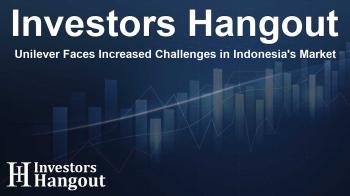Unilever Faces Increased Challenges in Indonesia's Market

Unilever's Struggles in Indonesia
In recent months, Unilever has been grappling with significant challenges in Indonesia, a market crucial for its operations in Southeast Asia. The global consumer goods giant, known for brands like Axe and Lifebuoy, is facing a boycott sparked by contentious geopolitical issues, significantly impacting its market presence amid fierce competition from local brands.
Impact of the Boycott
The boycott against Unilever and other multinationals, primarily due to perceptions of their support for Israel, has led to noticeable declines in market share. Reports indicate that Unilever's market presence in Indonesia dropped from 38.5% to 34.9% over the past year. This shift underscores the changing consumer sentiment in a market where approximately 87% of the population identifies as Muslim.
Market Challenges and Local Competitors
Unilever's encounter with declining market share isn't merely due to the boycott; it also stands in competition with numerous local brands that often provide cheaper alternatives. Companies like Wings Group and Mayora Indah have increasingly taken market space, appealing to budget-conscious shoppers. For instance, a 400-millilitre bottle of Wings' Nuvo liquid soap can cost about 20% less than Unilever's Lifebuoy, evidencing the growing pricing pressure on Unilever's products.
Financial Performance and Responses
Financial results indicate that Unilever's Indonesian branch reported an 18.2% decline in underlying sales, equating to about 8.4 trillion Indonesian rupiah ($533 million). Despite still holding a significant position in the market, with a revenue contribution of $2.39 billion in 2023, the company recognizes the need for adaptation amidst declining brand loyalty.
Adapting to Consumer Needs
Executives at Unilever have acknowledged the necessity for a strategic overhaul. Indonesian president Benjie Yap emphasized the objective of fine-tuning product offerings in response to emerging consumer preferences and societal changes. With the rise of online shopping and a demand for better pricing, the company aims to revitalize its brand image and product distribution.
Future Outlook and Strategies
Looking ahead, Unilever is aware of the challenges posed by shifting market dynamics. They are focused on refining pricing strategies and optimizing their product placement in various retail spaces. The strategy aims to enhance brand visibility and maintain competitiveness against local giants buoyed by aggressive promotions and lower price points.
Community Response and Market Trends
The community sentiment has also been pivotal in shaping market trends. With boycotts gaining momentum, shoppers are increasingly opting for local alternatives over Unilever products. Analysts have noted that competitors are benefiting from this shift, particularly in critical sectors such as beauty and packaged food. The e-commerce boom is also a contributing factor, as aggressive promotions lure consumers toward homegrown brands.
Long-Term Implications for Unilever
As Unilever navigates these turbulent waters, the brand's long-term implications in Indonesia remain uncertain. Continued consumer activism could transform the competitive landscape entirely. Unilever's response to these challenges will be critical in determining whether it can regain and grow its market share in its operational regions. The company remains steadfast in its commitment to adapt and thrive amidst these evolving conditions while implementing necessary adjustments in product offerings and consumer engagement strategies.
Frequently Asked Questions
What led to the boycott against Unilever?
The boycott against Unilever was largely prompted by consumers perceiving the company's operations as supportive of Israel amidst ongoing geopolitical tensions.
How has Unilever's market share changed in Indonesia?
Unilever's market share in Indonesia decreased from 38.5% to 34.9% over the past year due to the combination of boycotts and competition from local brands.
What strategies is Unilever implementing to recover?
Unilever is focusing on refining pricing structures, enhancing brand visibility, and better managing product distribution to adapt to changes in consumer preferences.
How have local brands responded to Unilever's decline?
Local brands have taken advantage of Unilever's decline by offering lower-priced alternatives and ramping up aggressive promotions, particularly on e-commerce platforms.
What is the community sentiment towards Unilever currently?
The community sentiment is leaning towards favoring local brands, with many consumers boycotting Unilever products in response to social issues and perceived corporate stances.
About Investors Hangout
Investors Hangout is a leading online stock forum for financial discussion and learning, offering a wide range of free tools and resources. It draws in traders of all levels, who exchange market knowledge, investigate trading tactics, and keep an eye on industry developments in real time. Featuring financial articles, stock message boards, quotes, charts, company profiles, and live news updates. Through cooperative learning and a wealth of informational resources, it helps users from novices creating their first portfolios to experts honing their techniques. Join Investors Hangout today: https://investorshangout.com/
Disclaimer: The content of this article is solely for general informational purposes only; it does not represent legal, financial, or investment advice. Investors Hangout does not offer financial advice; the author is not a licensed financial advisor. Consult a qualified advisor before making any financial or investment decisions based on this article. The author's interpretation of publicly available data presented here; as a result, they should not be taken as advice to purchase, sell, or hold any securities mentioned or any other investments. If any of the material offered here is inaccurate, please contact us for corrections.
